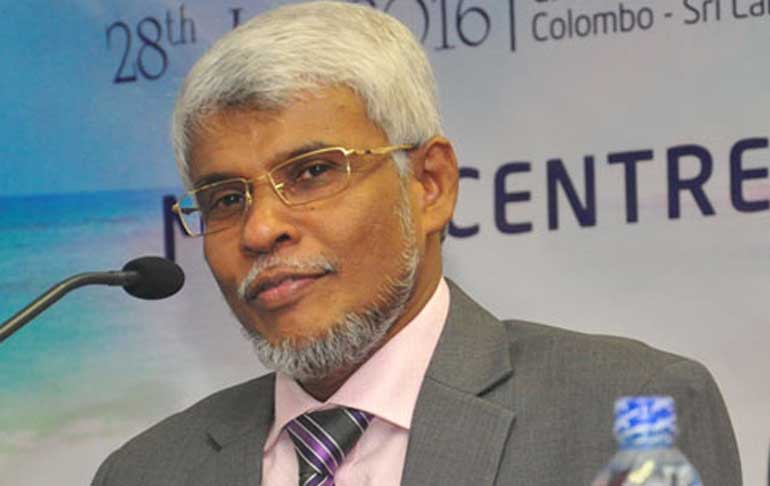Saturday Feb 14, 2026
Saturday Feb 14, 2026
Saturday, 11 June 2016 00:00 - - {{hitsCtrl.values.hits}}
 Eastern Province Chief Minister Nazeer Ahamed
Eastern Province Chief Minister Nazeer Ahamed
 It is characteristic of our times that Nazeer Ahamed, the Chief Minister of the Eastern Province, came to national attention controversially, stridently protesting an issue of protocol; not in the general application of a pre-determined order of formalities, but taking umbrage at an unforeseen incident concerning himself; not at a State event or a Provincial Council meeting, but at a minor function held in Sampur, at a small school receiving some equipment donated by a business organisation.
It is characteristic of our times that Nazeer Ahamed, the Chief Minister of the Eastern Province, came to national attention controversially, stridently protesting an issue of protocol; not in the general application of a pre-determined order of formalities, but taking umbrage at an unforeseen incident concerning himself; not at a State event or a Provincial Council meeting, but at a minor function held in Sampur, at a small school receiving some equipment donated by a business organisation.
Obviously, it was not a typical day for the Chief Minister, his arrival at the function going unnoticed (or unheralded) by the organisers! Peeved by what he obviously considered a serious lapse, the Chief Minister seethed a few minutes later when a naval officer assisting at the function obstructed his attempt to get on the stage. He claimed that impediment to be a breach of protocol. Unfortunately for the Chief Minister, the sorry saga was captured on tape and went viral.
The word “protocol” is given several meanings in the Oxford Dictionary, including, terms of a treaty, diplomatic etiquette and official formulas of a charter. But the Chief Minister was not talking about any of these things; the essence of what he was referring to is something deeply embedded in a hierarchical society, particularly indigenous, very Eastern.
From such an obtuse culture only can come the obligatory and verbose acknowledgement of the so-called eminent persons present at every public meeting, ‘most honourable’, ‘extremely respected’, ‘highly educated’ ‘very reverent’: the podium apparently filled with the best of humanity. You don’t need to wait too many years before many of these ‘excellent’ characters are found to be blackguards, fraudsters or worse. At the best, if not wrongdoers, they will be shown to be absolutely mediocre, wearing a thin disguise of superiority.
Strange pecking order
A visitor from a more evolved society will be struck by this strange pecking order apparent at almost any function in this country, even if private in nature. The purpose of the function is immaterial, when the person of the leader is present, a “protocol” automatically kicks in; reason or fairness has nothing to do with it.
Even at an informal dinner buffet for example, it is not the elderly, the young or the women who have precedence, but the “leaders”. At any government function, when it’s time to serve the syrupy cup of tea, the peons start with the Minister first and then follow an order of precedence, peculiar to their mindset. It does not matter that the Minister is the host. The universally honoured first-come, first-served principle has no meaning either, we follow the protocol; the hierarchy prevails!
Good wine needs no bush
A friend of mine had been present when Prince Charles launched a new wing of the Colombo British Council during the SARACC conference in 2014. Charles had arrived at the function early, and was mingling unobtrusively with the crowd when my friend met him. There were no seats, all, including the Prince, were standing.
The British High Commissioner and the senior staff did not provide an obvious entourage but were busy with other arrangements. There was only one functionary, who stood discreetly, at a comfortable distance. Things moved with a pleasant casualness. The Prince made a short but pithy speech. Then he shook a few more hands and off he went out of the gate (no vehicle was brought right up to the front entrance).
Now, Prince Charles also comes from a smallish island nation, but one that once built a world empire. In many fields of human endeavour, the British contribution to the advancement of the human race as a whole is huge. This race of tough and vigorous empire builders were not mere conquerors only. Darwin, Shakespeare, Dickens, Bell, Newton to Stephen Hawking are household names worldwide. Their pre-eminence in diverse fields, from medicine to law, from applied sciences to literature belies the land’s relative geographical insignificance. Britain is home to some of the best universities and schools in the world.
Even in the sporting field, the various games that owe their origin to the British are astonishing. Although the empire is gone today, Britain is still one of the richest countries on the globe. There will be many a Sri Lankan willing to give an arm and a leg to migrate to that country, still more, will be more than overjoyed at the opportunity to claim an educational qualification from there. Such a qualification will automatically place them high in the Sri Lankan esteem. Almost every Sri Lankan President had ensured an education for his children in England. When things go badly for them in their country, England is the choice of refuge for many of our politicians.
That being the reality, it would be absolutely pointless, even if he were so inclined, for Prince Charles to claim a prominence at a small function by raising protocol issues. He would not even dream of it. Good wine needs no bush; a person of true stature requires no posturing. Dignity and stature come from the personal qualities of the man, and not empty ceremony.
Protocol of decency
It is clear that neither the Governor nor the Chief Minister donated the equipment that the school children received that day. Whatever other assistance they may feel moved to give that school on another occasion; will only come from the taxpayer’s money. Their lifestyle, cars, bungalows, entertainment are also met with public money. But that is not enough. According to their understanding of protocol, they must be given eminence and priority at every function they step in to; small men, heavy-footed, bumptious, demanding their moment in the public eye.
If there is any rationality in our society, any understanding of the meaning of public life, any decency in our souls; we should acknowledge that it was a day meant for those poor children receiving basic educational aids from a well-wisher. According to a protocol of decency, it should have been the children, the teachers and the parents receiving priority, not some cheap politician hell-bent on gaining mileage even at a school gathering.
In societies in perpetual turmoil, indecencies lead to more and even graver indecencies.
Prevalent political culture
The Chief Minister’s misdemeanour was followed by a howl of protests, some even tinged with racial undertones. It is unfortunate that the Chief Minister happened to be a Muslim. Such boorish behaviour is not confined to politicians of one community. That is the prevalent political culture today. Their indecencies are not always in words. When they are about their business, our politicians will brook no opposition, law or limitation. But such conduct rarely gets into the public domain. Even if it did, due to various intervening reasons, the issues are watered-down.
Take the case of an awarding of a large tender by a Minister (or a system driven by him) under the influence of inducements or in violation of pre-set tender conditions. That award may be challenged in a court of law. But due to the inevitable delays in the hearing and the technical complexities, the matter gets obscured. The economic damage to the country by an improperly awarded tender is immense, in relation to which the effect of the angry words of the Chief Minister, ugly as they were, are not irremediable.
To bring in a racial element to this unfortunate incident is extremely unfair by the larger Muslim community. In fact Muslims, principally those in the Eastern Province, were also victims of terrorism for many years and contributed immensely in the fight against terrorism. They have kept faith in the country. Many of them served in the armed forces and even paid the ultimate price to keep the country together.
A protocol of decency cannot ignore that.